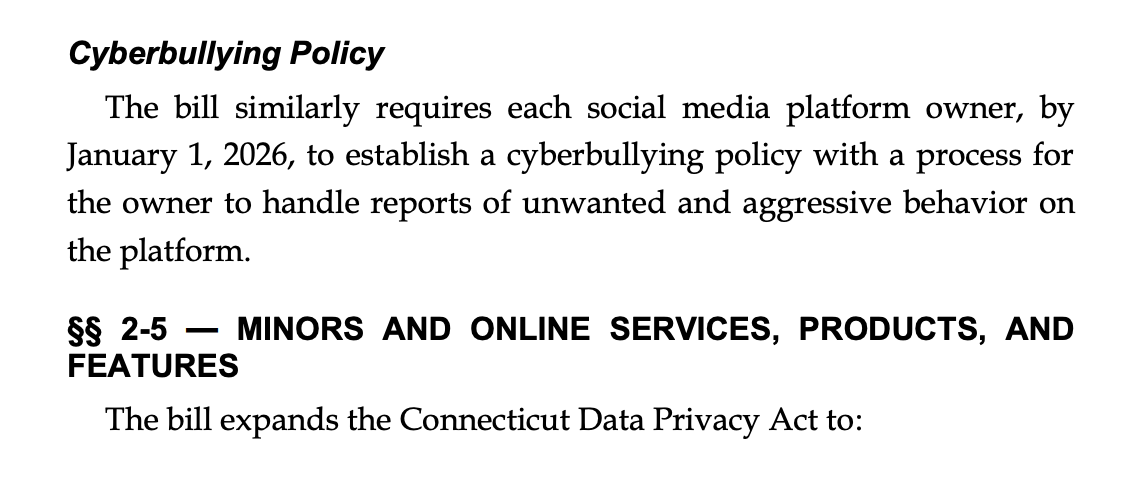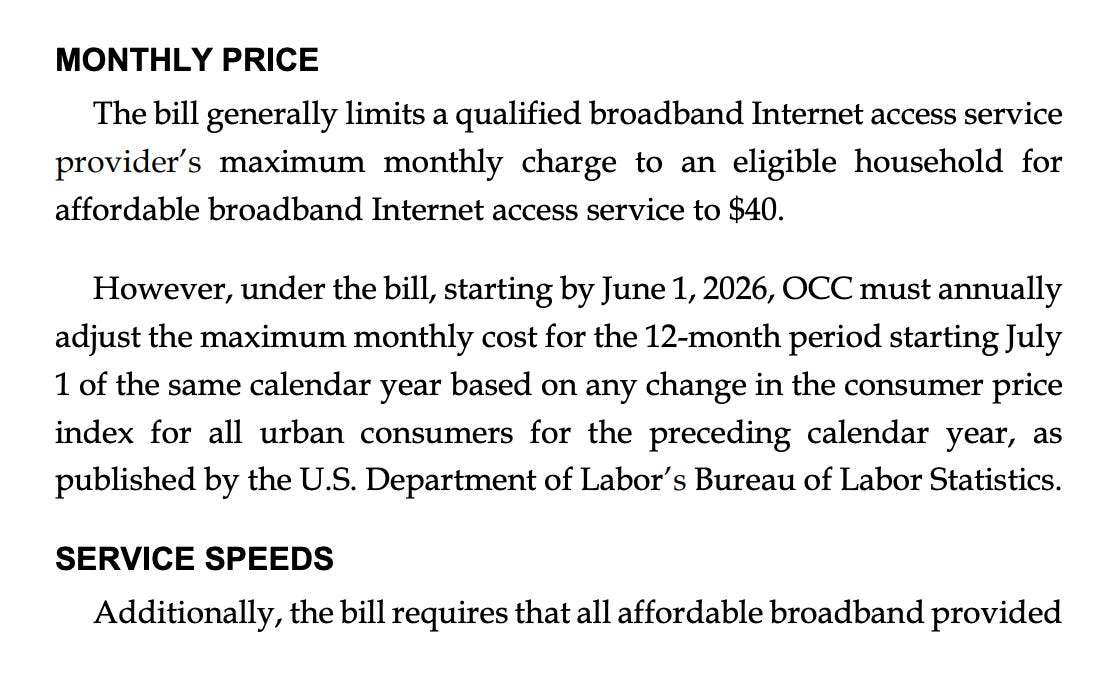Connecticut’s Latest Data and Social Media Governance Rules
Newsletter Issue 57: A clear look at Connecticut’s new data and social media platform rules
Connecticut has passed a new law that brings real changes to how social media, online services, and internet providers operate. From stronger privacy rules to clear protections for users facing online abuse, this law sets new expectations. It also introduces capped internet prices for low-income households.
New Rules for Social Platforms
Beginning 1 October 2026, social media platforms operating in Connecticut will be required to do more than just moderate content and sell ads.
Under the newly enacted SB 1295, each platform must create an online safety center designed to provide meaningful support for users navigating harmful online behaviour, including cyberbullying.
The law defines cyberbullying in clear terms and places accountability squarely on platform owners to respond properly when such behavior occurs.
Within this new requirement is the mandate for platforms to embed a visible and accessible online safety center within their user interfaces.
This center needs to house real resources that includes contact points and pathways to mental health services, with specific reference to help for anxiety and suicide prevention.
The new law calls for active placement of tools that can help users deal with harassment and distressing content.
The safety center must include clear explanations on how to report abuse or harassment, alongside educational materials about the effects of social media on mental health.
For some companies, this will require a redesign of their user experience (UX) frameworks. For others, it will force them to explain reporting tools they have kept intentionally vague for too long.
One clause that deserves particular attention is the mandate for a public cyberbullying policy.

By October 2026, each platform owner must publish and maintain a cyberbullying response policy.
This policy must lay out how the platform handles reports of abuse.
The law demands a transparent, working process. The social media platform must answer how a user report is received, what steps are taken, and what outcomes are possible.
The policy must also reflect an understanding that harmful content affects users differently. Whether the abusive post comes from a stranger or a known account, the user should not be left navigating confusing protocols or endless waiting periods.
This provision might seem modest on paper, but it could become a significant force for improved platform governance.
If enforced as intended, users in Connecticut will be able to expect a minimum baseline of response and respect for complaints.
Of course, this raises the question of compliance.
How will Connecticut ensure that social media platforms actually follow through?
The legislation places the burden on the platform owner.
There is no shortcut or grace period once the October 2026 deadline comes around.
The law may be enforced through audits or user reports, and failure to comply could expose companies to escalating legal pressure.
Although SB 1295 avoids assigning new enforcement powers under Connecticut’s general consumer protection act, that does not mean non-compliance will be ignored.
It is also worth pointing out that SB 1295 does not discriminate based on company size.
The law defines a social media platform based on function, not scale.
So long as a company operates a platform that allows users to create profiles and interact socially, it must comply.
This will affect tech giants, certainly, but also smaller platforms, niche networks, and emerging startups.
Some companies may already offer parts of what SB 1295 demands, especially those that operate globally and are preparing for other regional requirements.
However, most will need to revise internal policies and product features to align with Connecticut’s more structured expectations. More importantly, these efforts will need to be sincere.
Token pages and disclaimers that are hard to find or impossible to act on will likely invite scrutiny.
Expanded Data Protections
The Connecticut Data Privacy Act (CTDPA) was also amended expanded under SB 1295. Legislators have decided that personal data deserves better care, and they are not being shy about it.
The new amendments lower the threshold for which businesses must comply, and that means more companies are now on the hook.
If your organisation processes the data of 35,000 Connecticut residents, down from the previous 100,000, you are now firmly within the scope of the law.
The state has also eliminated the revenue-based exception.
Previously, businesses could fall outside the law if they dealt with only 25,000 consumers but earned less than 25 percent of revenue from selling personal data.
That escape hatch is now closed. If you process sensitive data or traffic in personal data as part of commerce, welcome aboard. This expansion brings in a broader class of controllers and processors.
Profiling has not escaped notice either.
If your business uses automated data processing to make decisions about housing, credit, employment, or similar high-impact services, Connecticut wants you to slow down and think before you process the data.
Controllers must now conduct formal impact assessments when such profiling leads to a decision that has legal or significant effects.
These assessments are not a rubber-stamping exercise. They require businesses to examine what data is used, why it is used, whether it is necessary, and what the potential risks are. And yes, you are expected to document it properly.
Connecticut residents now have more power to push back against profiling.
If their data is used in automated decisions that affect their lives in material ways, they can ask for an explanation, review the data used, and even request corrections if the data was wrong and used for profiling, particularly when the decision relates to housing.
This level of access is a marked change from the days of faceless algorithms silently rejecting applications without accountability.
Affordable Broadband for Eligible Households
Connecticut has now introduced something it probably should have done years ago: basic, affordable internet access for low-income residents, with enforceable terms and proper oversight.
Under the new Net Equality Program, broadband providers doing business in the state are required to offer eligible households broadband internet service for no more than forty dollars ($40) a month.

That includes taxes, equipment fees, and whatever hidden charges internet providers usually invent. This price is locked in, with regular updates tied to the Consumer Price Index starting in 2027.

To qualify for this capped plan, a household must include at least one person enrolled in a recognised public assistance program, such as SNAP, and reside in the provider’s service territory.
These providers, in turn, are expected to make commercially reasonable efforts to raise awareness about the program and to post enrolment instructions in a clearly visible section of their website.
Starting in October 2026, these providers will also need to meet minimum service standards.
During the first year, speeds must hit at least 100 megabits per second for downloads and 5 megabits per second for uploads.
After that, the upload speed floor jumps to 20 megabits per second. Providers are expected to deliver service fast enough to support online learning and telehealth—so a household should not have to choose between a video consultation with a doctor or logging into a school portal without buffering.

There is also a reporting obligation.
By February 2027 and every year after, each qualified provider must file a report with the Department of Energy and Environmental Protection.
This report must show how many eligible households signed up for the affordable plan and how many actually received it throughout the year.
There is no way around this requirement. If a provider wants to do business with state agencies after 2027, preference will go to those that offer affordable broadband.
We hope this policy update helps you stay informed on Connecticut’s digital policy initiatives. Your thoughts matter to us. If you have comments, insights, or questions about the Bill SB 1295 or related topics, feel free to reply to this newsletter. We read every message and welcome your perspective on these developments.




